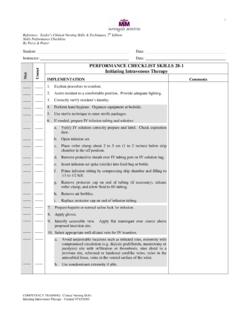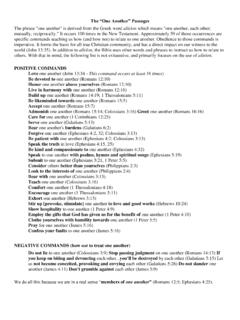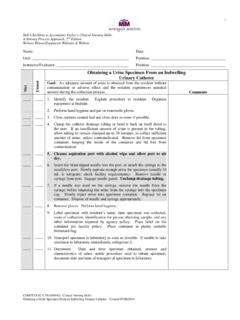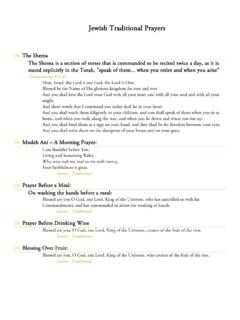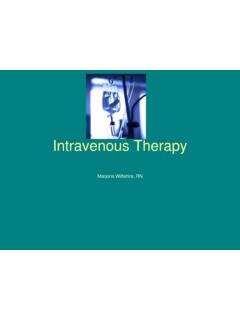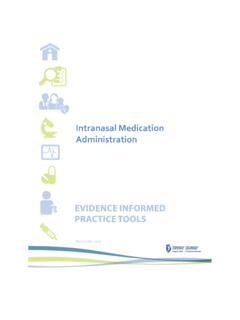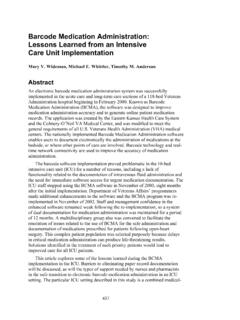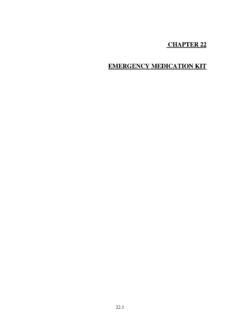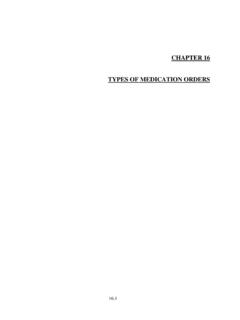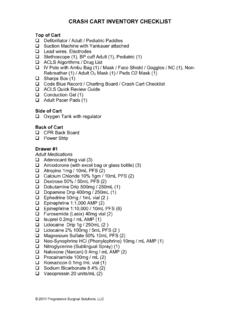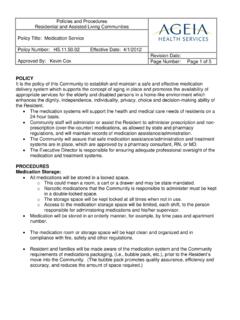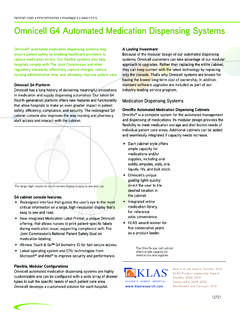Transcription of Medication Pass Fundamentals Part 2 of 3 Final
1 Medication Pass Fundamentals Part 2: The 7 Rights, 3 Way Check, Basics of Preparing and Administering: Oral, Ophthalmic, Otic and Nasal Medications, Common Errors Carrie Allen ,CGP, BCPS, CCHP 4/2014 Intended Audience* Skilled Nursing Facilities (SNF), Assisted Living Facilities/Communities (ALF/ALC), any facility or community setting that offers Medication pass as part of their services Clinical and non-clinical management: Directors of Nursing, Assistant Directors of Nursing, Regional Nurse Managers, Administrators Staff that are involved in performing Medication passes or who are in training to perform Medication pass: Registered Nurses (RN), Licensed Vocational or Professional Nurses (LVN, LPN), Certified Medication Aides or Technicians (CMA, CMT), etc.
2 Staff that may require a refresher or re-training secondary to a Medication error Facilities who have been permitted by their state governing body to use the training as part of a Plan of Correction 2 *Though much of this information is derived from regulations for SNF, these practices will decrease Medication errors in any type of facility Topics Covered Medication Pass Basics/Getting Started The 7 Rights The 3 Way Check Preparing Medications Administration of Oral, Ophthalmic, Otic, Nasal Medications Common Mishaps and Errors 3 How to Begin General processes for all meds passed 4 Have your materials ready!
3 Reminder: we covered preparation prior to med pass in part 1 of this 3 part series 5 How to Begin General processes for all meds passed Understand your facility s policies and procedures and/or any applicable state laws, know where to find these references Look at the MAR - never go by memory or by just looking at the medications/ Medication cards Check for allergies (medicine and relevant food), every single time you pass medications New allergies develop Drop offs New medications are prescribed A documented allergy is real until proven otherwise 6 Begin with the Basics Check Orders Before and During Med Pass Verify orders are correct Look for new or changed orders Ensure medications are available Have Should Not Crush and med storage lists handy Recall proper administration techniques 7 Remember - General processes for all meds passed Check the resident s availability and readiness to take his/her medications before you prepare them Remember privacy and
4 Dignity rules Do not interrupt pleasure activities ( , meals) unless there is an order to do so Do not bring the cart into the dining area Do not perform blood sugar checks or administer medications in common areas of the facility, especially: injections, meds given via tube, patches, inhalers, eye drops, ear drops 8 Remember - General processes for all meds passed 9 Do not pre-pour medications, prepare them immediately before administration Remember - General processes for all meds passed 10 Only administer medications you have personally prepared Only use the medications specifically intended for that resident, no borrowing -violates professional standards of practice F281 Inspect each dose for expiration date, contamination, particulate matter, discoloration.
5 Or defect Wasted controlled substances should be destroyed with another appropriate observer and documented as per facility policy, federal and state laws/regulations Remember - General processes for all meds passed 11 Wash hands with soap and water before and after the Medication pass process as a whole Wash hands with soap and water or use hand sanitizer between residents as appropriate (and even during an individual med pass as needed) Remember, hand sanitizer should be alcohol based, should be allowed to dry and does not kill the intestinal infection Clostridium difficile (must use contact precautions and wash hands before and after) Remember - General processes for all meds passed Monitor and record required vital signs; typically you may use vital signs taken within one hour, but check policies and procedures as well as specific Medication information Are they applicable?
6 ( are we monitoring the correct sign/symptom related to the Medication ) Are they in a desired range? If not, take action if they are above or below a specific target. Remember some meds require more specific monitoring ( , apical pulse for digoxin) Are there signs and symptoms of bleeding if the resident is taking an anticoagulant? More generally, is the resident alert and acting normally? If not, look for medications, situations and medical conditions that need to be addressed 12 How to Begin - Preparing Medication doses: 3 Way Check each Medication to the order on the MAR as it is removed from the resident s Medication drawer Check the resident s name, drug name, dosage form, strength or concentration, dosage, administration route, frequency, duration and time it is to be given If there ever is a difference between the MAR and the Medication , stop Take Action.
7 Review the order in the chart, check with your supervisor, call the pharmacy if needed Do not give the Medication until you know the order is correct and it has been corrected on the MAR 13 How to Begin - Preparing Medication doses: 3 Way Check the drug to the MAR after it is prepared/poured as you return the Medication to storage/immediately before administration to the resident. 14 How to Begin- Entering room and preparing resident Identify yourself knock on door, explain why you are there If resident likes to hold meds in their hand are their hands clean? Explain what meds you are giving and why Ensure the resident is correctly positioned to prevent choking, you may have to re-wash hands and use gloves If you must set items down on a bedside table or other surface, make sure you have a paper towel handy 15 Remember the 7 rights 16 Remember the 7 rights 17 Hand Hygiene After administering the medications properly, perform hand hygiene before documenting the administration on the MAR 18 Remember the 7 rights Document Medication was given after giving it.
8 Before going on to the next person Observe and document if the resident has any ill-effects from medications (and report) Record the results of as needed (PRN) medications Important with all medications, especially pain medications: record pain level and response to Medication Document and communicate to next shift if a response is still pending 19 Remember the 7 rights Right Documentation 20 If you are in the middle of preparing meds and realize you are missing a dose, do not stop Give the doses you have prepared, and the rest of the medications due for that resident at that time Then investigate (or ask for assistance to investigate) and make arrangements to obtain the Medication Use the emergency kit (E-kit)
9 If necessary If you skip a dose or a resident, have a HIPAA compliant process to remind yourself ( , flag the MAR), and return to that person as soon as possible do not forget to document irregularities Remember the 7 rights 21 Route Specific Concerns Oral, Ophthalmic, Otic, Nasal 22 Preparing Oral Medications Hand hygiene before, during (if needed), and after passing meds Do not pop pills or pour liquids while standing over an open med cart drawer use the top surface of the med cart If you accidentally pop an extra pill or one comes out of the blister pack, do not tape it back in, discard it properly and remember to document waste as appropriate 23 Preparing Oral Medications Keep gloves handy if the pill must be touched Use gloves to open capsules, and only open capsules that are allowed to be opened If a pill drops on/in the cart, floor, trash etc.
10 , discard it properly and prepare another dose Do not touch the inner surface or rim of the med cup or beverage cup, if you do, discard it and use another one 24 Preparing Oral Medications If it is allowable in your state and facility to split pills, use gloves and a pill cutter, do not split un-scored tablets If it is allowable to crush medications, use a pill crusher or mortar and pestle, crush meds into fine powder, mix in applesauce or other item (water for enteral tubes) FYI: not all medications that are scored can be crushed [ Toprol XL (metoprolol succinate)] If a mortar and pestle is used, clean after each use 25 Preparing Oral Medications Be sure to adequately shake liquid suspensions so that the dose given is accurate Pour liquids into a graduated Medication cup that is sitting on the top of the med cart, judge the meniscus at eye level Do not pour excess liquid back into the bottle, discard it properly 26 Preparing Oral Medications Pour liquids with label facing you and wipe up spills immediately, wipe drips on the bottle away from the label and the container opening Use oral syringes for doses less than 5 ml.




